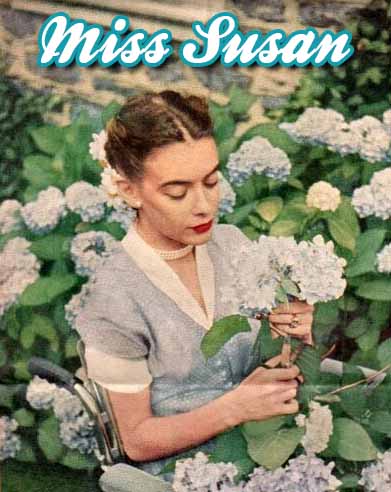



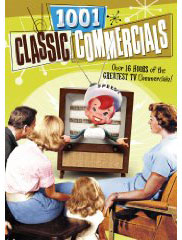


 |
 |
 |
 |
 |
 |
 |
|
| |
|||||||
|
Susan—born in 1921 in Spokane--was a pert and pretty young actress who made her feature film debut in an uncredited role in “Susan and God” in 1940. Soon after, Peters (original last name: Carnahan) was put under contract to Warner Bros. and appeared in minor roles in various films including “Sante Fe Trail” with Errol Flynn and Olivia de Havilland. But it was after being dropped by Warners and signed by MGM that Peters’s star began to ascend. Though she began with Metro in such pedestrian fare as a “Dr. Gillespie” installment and an “Andy Hardy” film (both 1942), Peters also appeared in the classic “Random Harvest.” Appearing alongside MGM golden girl Greer Garson and Ronald Colman, Peters made her mark and was Oscar nominated for Best Supporting Actress for her role in that film. Suddenly, then, Susan found herself among MGM’s rising stars and found her name suddenly moving up in the credits. She got top billing in their 1943 “Young Ideas” and, that same year, was the leading lady opposite Robert Taylor in “Song of Russia.” She was among a trio of up-and-comers in “Keep Your Powder Dry,” sharing the screen with Laraine Day and Lana Turner in that film released in 1945. But it was in 1945 that tragedy struck. That year, on New Year’s Day, Peters on a hunting trip with her husband—the actor and later director Richard Quine--and two of his cousins near San Diego. At one point on the trip, Peters reached for a rifle which somehow misfired. It discharged and she was shot through the abdomen. Shot pellets damaged her spinal cord and Peters became paralyzed from the waist down. She would never walk again. Obviously, it took Peters time to recover and come to terms with her injury. The film she had been working on before the accident was, of course, abandoned. Not long after, her marriage ended and Peters became a single mom to her young song, Timothy. She also sank into a depression. But friends—including Lucille Ball—encouraged her to return to acting. Peters, now wheelchair bound, bravely rejected various scripts the studio offered to her which she thought took a “Pollyanna” view of her disability. Instead, she worked in radio, filmed the noir thriller “Sign of the Ram” in 1947 and toured in stage productions where her condition was an asset, not a liability. For example, she appeared in Tennessee Williams’s “The Glass Menagerie” and in “The Barretts of Wimpole Street” where she played the handicapped poet Elizabeth Barrett Browning. Then, in 1951, Peters came to television. She starred in the (ultimately) short-lived daytime drama “Miss Susan” which was broadcast daily on NBC as part of the network’s afternoon line-up. Much about “Miss Susan” is notable. First, somewhat surprisingly, the program was produced and broadcast out of Philadelphia. This was 1951, and though the majority of TV was then coming out of New York, neither the Big Apple nor LA, as it would soon, had cornered the market on TV. In fact, several national programs were being emitted from Chicago. Still “Susan” does seem to be one of the very few nationally-broadcast programs to come from Ohio.
And soaps about professional women were not unheard of either; radio’s “Portia Faces Life,” also told the story of a female attorney. Yet, “Miss Susan’s” strong female point-of-view and unique, non-traditional career undermines many assumptions that many people hold about how women were portrayed on so-called “early” television. “Miss Susan” trounces the stay-at-home stereotype, and the “Susie Homemaker” troupe. Finally, of course, there’s the matter of “Miss Susan’s” disability. Even today, a disabled character on TV is a rare thing. Even further unusual is a disabled character being played by a disabled actor—usually being wheelchair bound is just part of the performance, consider the years Raymond Burr enacted “Ironside” or even more recent examples like Kevin McHale on “Glee” or Colton Dunn on “Superstore.” (A few notable exceptions would be Madlyn Rhue in her semi-reoccurring role on “Murder, She Wrote,” Jim Brynes on “Wiseguy” and Micah Fowler on the sitcom “Speechless.”) So, for Susan Peters to play this character, Susan Martin, was not only an extraordinary feat for her but also one for television and for society. Sadly, for all its nobility and uniqueness, “Miss Susan” was not on the air very long. The program debuted in March of 1951 but was off the air as of December of 1951. Near the end of its run, the program underwent an overhaul where the focus was shifted to the other characters as much as Susan and the show got a new name “Martinsville, USA.” But it was all for naught and the program expired only about nine months after it began. Still, in those nine months, the series covered a lot of story. The series begins with Susan’s family maid, Laura, accused of theft! By October, as recapped by the “Chicago Tribune” the following had transpired: Laura Monroe has been acquitted of stealing. Edgar Hayes and Duke Andrews have been sent away for life for murder, and Henry Benson has been acquitted of murder. Susan Martin has married Bruce Landon, and Joan Benson has married Bill Carter. Joan is having a baby, Sam Martin has been kidnapped and beaten up, Bruce was shot, and some rascal has tried to murder Larry Hayes. Two episodes of the series—perhaps the only two to survive—are housed at the Library of Congress, one episode is from July of 191, the second, from August of 1951. Watching them today is fascinating on multiple levels. As was typical of most soaps (in fact most programs of that era), each episode of “Susan” is only 15 minutes long. (TV broadcasters were not yet convinced that home viewers would sit still for more than 15 minutes.) And once the earnest start-of-show laundry detergent ads (they were called “soaps” for a reason) are done, each “Susan” episode is probably only about 12 minutes in duration. The series was also performed live and the restrictions and risks of live television are evident. For example, only a couple of sets are employed in each installment and the actors are brave in the stage business they take on in each LIVE broadcast. In one episode, cast members play ping-pong, which, one assumes, is a difficult thing to rehearse. One episode also employs a child actor who does a truly commendable job. Still, sometimes, mess-ups are apparent--in one episode, the actor playing opposite Peters assigns the wrong name to a character and Peters has to improvise quickly, correcting her co-star and getting the scene back on track. Even at only (barely) 15 minutes, and obviously very dialogue heavy, the installments have a rather languid pace which might say more about our modern, ever-decreasing attention spans than it does about 1950s TV. So, rather than several developments per episode, we might have just one. For example, in the second episode screened, which take place almost entirely in a DA’s office, the pending arrival and then the findings of a ballistics report is the main, and only, focus of about half the episode. Interesting as this series might be as a window into the soap genre at the start of the TV era, it is, of course, surpassed in notoriety by how its central character is portrayed. In neither episode of “Susan” I watched was there much made about Susan’s condition. Nor is it hidden—Peters/her character is plainly in a wheelchair yet she is not depicted as helpless nor burdensome. In fact, she is seen as noble and exceedingly able. She’s even seen as a viable love interest for her eventual husband on the show, Bruce Landon. Landon is seen as just gaga over her. And she’s depicted as a quality attorney, one sought out for her expert counsel and advice. In the DA’s office scene, Susan goes toe-to-toe with the other attorney on legal precedent. All in all, “Miss Susan” is a pretty remarkable series about a remarkable woman that starred an equally remarkable woman in the lead role. Sad that the program did not endure or exist longer. According to various recent write-ups about the series, at the time of this production, the show faced some public pushback among those who believed Peters and her condition were being exploited by the program. But, in my search of newspaper articles from the era, I’ve found no mention of it. Nevertheless—it could be true. Perhaps as courageous as “Miss Susan” AND Miss Peters was, it was difficult for some people, at that time, to face a disability so directly, consider the efforts that so many went to for so long to hide the wheelchair of FDR. And why, when a character is portrayed as handicapped, as Raymond Burr’s would be later on “Ironside” (which debuted in 1967), it is often “easier” knowing that, when the camera stops, so does that’s actor’s infirmity. Sadder still in terms of “Miss Susan” was the last days of Susan Peters. After the show’s demise, and despite announced plans to resume her touring in theater, and press reports of a new real-life romance, Peters continued to be plagued by sundry health ailments including various kidney issues. And she struggled with depression. She died in October of 1952, only 10 months after the last episode of her daytime show. She was only 31 years of age. It was rumored at the time of her death that, near the end, she had begun to starve herself in order to hasten her passing. Today, 70 years since “Miss Susan,” one is hard pressed to think of very many programs—from any time of the day, of any genre—built around a person with a disability and even harder to think of one where the infirmity is real and not an act like on the aforementioned “Ironside.” (Marlee Matlin’s “Reasonable Doubts” being a notable exception.) Hence, the importance of “Miss Susan” (and the real-life woman who played her) remains a vital piece of our television history. |
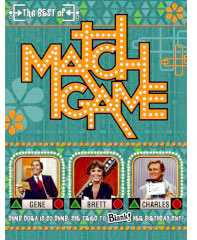 |
 |
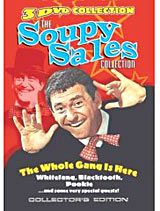 |
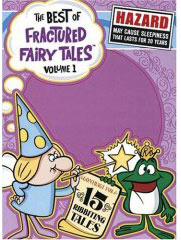 |
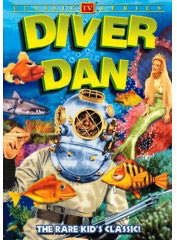 |
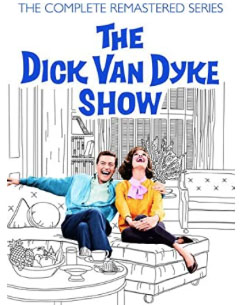 |
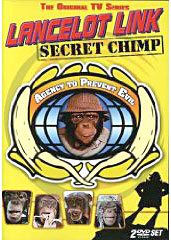 |
|
|
||||||||||
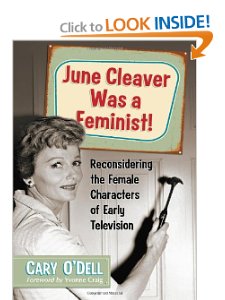 |